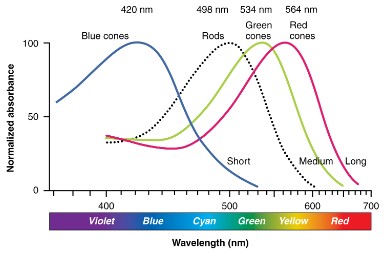Red or green flashlight for night photography
Mar 27, 2023 10:44:05 #
I’m going to be going out at night and have read that red or green light is better for your eyes than a white light.
Does anyone have experience with using a red or green light when doing night photography and is it worth investing in colored light for this?
~Kevin
Does anyone have experience with using a red or green light when doing night photography and is it worth investing in colored light for this?
~Kevin
Mar 27, 2023 10:49:38 #
My personal preference has been red.
--Bob
--Bob
Kevin.M wrote:
I’m going to be going out at night and have read that red or green light is better for your eyes than a white light.
Does anyone have experience with using a red or green light when doing night photography and is it worth investing in colored light for this?
~Kevin
Does anyone have experience with using a red or green light when doing night photography and is it worth investing in colored light for this?
~Kevin
Mar 27, 2023 10:49:44 #
Mar 27, 2023 10:51:07 #
In dark parks, they usually request red lights.
Mar 27, 2023 10:52:05 #
Mar 27, 2023 11:13:13 #
It takes about 30 minutes or more for your eyes and brain to get "night vision". Once there, you can maintain it using only red light. But, if you slip up and look at white light, the night vision goes away. In an environment like on an Aircraft Carrier at sea where they can control all the lights, it works very well. Anywhere near a city, night vision doesn't work at all.
Mar 27, 2023 11:19:37 #
All military vehicles, including the aircraft I flew, have red instrumentation for night operations.
Mar 27, 2023 11:32:42 #
I use a Black Diamond headlight with Red, Green, Blue as well as white options. I use the red for night time work. Green is good for tracking animals as it shows blood very well.
Mar 27, 2023 11:37:02 #
I bought an LED flashlight at Batteries Plus , brand name NEBO, that takes 4AAA batteries and has a white spot mode, A white flood mode, and a red flood mode. All modes are rheostat controlled and the head can be rotated 90 degrees. It also has a magnet in the base so it can stick to something ferrous like the hood of a car. It was $25 and seems to fit all flashlight needs.
Mar 27, 2023 11:51:48 #
larryepage
Loc: North Texas area
Kevin.M wrote:
I’m going to be going out at night and have read that red or green light is better for your eyes than a white light.
Does anyone have experience with using a red or green light when doing night photography and is it worth investing in colored light for this?
~Kevin
Does anyone have experience with using a red or green light when doing night photography and is it worth investing in colored light for this?
~Kevin
Red light preserves your night vision. Green light will kill it immediately by depleting the "visual purple" in your retina. That's the chemical that produces night vision. It requires 20-30 minutes to replenish.
I find that red light also results in much better contrast in green vegetation and soil, making it much easier to see to walk safely.
Mar 27, 2023 12:05:19 #
Mar 27, 2023 12:06:58 #
nimbushopper wrote:
I bought an LED flashlight at Batteries Plus , brand name NEBO, that takes 4AAA batteries and has a white spot mode, A white flood mode, and a red flood mode. All modes are rheostat controlled and the head can be rotated 90 degrees. It also has a magnet in the base so it can stick to something ferrous like the hood of a car. It was $25 and seems to fit all flashlight needs.
I have a light like that. First time I tried the red for night vision preservation I cycled through the white by accident. I was in the desert trying to shoot an eclipse. My effort was a large failure because I couldn't see the camera controls well enough. If there is a next time, I will have a red only light.
https://www.amazon.com/Celestron-93588-Astro-Vision-Flashlight/dp/B0000665V5/ref=asc_df_B0000665V5/?tag=&linkCode=df0&hvadid=385378401265&hvpos=&hvnetw=g&hvrand=2321952722021713117&hvpone=&hvptwo=&hvqmt=&hvdev=c&hvdvcmdl=&hvlocint=&hvlocphy=9033507&hvtargid=pla-437196298518&ref=&adgrpid=78981968352&th=1
Mar 27, 2023 12:34:55 #
I just came from a trip to Iceland pursuing the Northern Lights - failure while I could have just visited far Northern states last week. <grin> But all who had flashlights were red.
Mar 28, 2023 05:59:53 #
QUESTION BEST LIGHT FOR NIGHT VISION SCIENCE DETAILS:
"The ability to see in poor light depends on the presence of a substance in the eye called rhodopsin, or visual purple. It is destroyed by bright light but rapidly regenerates in the dark. "
[wnyurology? Urology journal! OH! when Peeing in the dark Red light is best for better aim.
 ]
]
https://www.wnyurology.com/content.aspx?chunkiid=21784
"Rhodopsin in the human rods is insensitive to <not destroyed by> the longer red wavelengths, so traditionally many people use red light to help preserve night vision. Red light only slowly depletes the rhodopsin stores in the rods, and instead is viewed by the red sensitive cone cells. "
CAVEATS:
"... red breaks down rhodopsin more slowly and, if preserving night vision is the main objective,... This is somewhat of a matter of opinion. Both <RED AND GREEN> are much better than white light. It is generally considered that red breaks down rhodopsin more slowly and, if preserving night vision is the main objective, red is better.
However, "green light penetrates a little better, and shows more detail.It may be preferred for distance vision, and for close up clarity, such as reading instruments or maps. Green is more commonly used in military situations, where it is claimed to be less detectable by night vision equipment. ...most of the night vision adaptation occurs within the first five minutes in the dark. Adaptation results in maximum sensitivity to light. In
dark conditions only the rod cells have enough sensitivity to respond and to trigger vision."
https://www.eskosafety.com/wp-content/uploads/2020/02/RED-OR-GREEN-FOR-NIGHT-VISION-LIGHTING.pdf
"The ability to see in poor light depends on the presence of a substance in the eye called rhodopsin, or visual purple. It is destroyed by bright light but rapidly regenerates in the dark. "
[wnyurology? Urology journal! OH! when Peeing in the dark Red light is best for better aim.

 ]
]https://www.wnyurology.com/content.aspx?chunkiid=21784
"Rhodopsin in the human rods is insensitive to <not destroyed by> the longer red wavelengths, so traditionally many people use red light to help preserve night vision. Red light only slowly depletes the rhodopsin stores in the rods, and instead is viewed by the red sensitive cone cells. "
CAVEATS:
"... red breaks down rhodopsin more slowly and, if preserving night vision is the main objective,... This is somewhat of a matter of opinion. Both <RED AND GREEN> are much better than white light. It is generally considered that red breaks down rhodopsin more slowly and, if preserving night vision is the main objective, red is better.
However, "green light penetrates a little better, and shows more detail.It may be preferred for distance vision, and for close up clarity, such as reading instruments or maps. Green is more commonly used in military situations, where it is claimed to be less detectable by night vision equipment. ...most of the night vision adaptation occurs within the first five minutes in the dark. Adaptation results in maximum sensitivity to light. In
dark conditions only the rod cells have enough sensitivity to respond and to trigger vision."
https://www.eskosafety.com/wp-content/uploads/2020/02/RED-OR-GREEN-FOR-NIGHT-VISION-LIGHTING.pdf
EYE SENSITIVITY TO LIGHT

Mar 28, 2023 06:03:50 #
Rather than buy an entire flashlight, I’d look for some colored plastic and cut a disk to cover ( or replace) the flashlight lens. Clear Plastic file folder covers come in all colors, and are inexpensive.
If you want to reply, then register here. Registration is free and your account is created instantly, so you can post right away.








